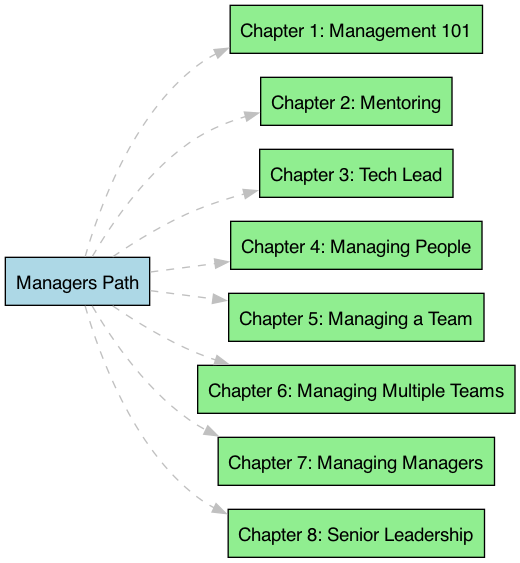Insights from The Manager's Path: A Guide for Tech Leaders Navigating Growth & Change
The Manager's Path by Camille Fournier is a comprehensive guide for those pursuing a career in engineering management. Fournier, drawing from her experiences, provides a structured roadmap for transitioning from an engineer to a manager and beyond. This book is a valuable resource not only for new managers but also for seasoned leaders seeking to refine their skills.

The Manager's Path: A Guide for Tech Leaders Navigating
Summary

Chapter 1: Management 101
Fournier starts by defining what a good manager looks like and what one should expect from their manager. She emphasises the importance of one-on-one meetings, regular feedback, and career growth opportunities. The chapter also discusses the significance of being managed well and taking ownership of one's career development.
Chapter 2: Mentoring
Mentoring is often the first step in management. Fournier highlights the role of mentors in onboarding new hires and interns, stressing the importance of effective communication, listening, and adjusting to the mentee's needs. She also discusses the pitfalls of mentoring and how to avoid them.
Chapter 3: Tech Lead
Becoming a tech lead is a crucial step in an engineering career. This role requires a blend of technical expertise and people skills. Fournier explains that a tech lead should focus on the team's productivity, delegate effectively, and manage projects. She also addresses the common misconception that the best engineer should automatically be the tech lead.
Chapter 4: Managing People
This chapter delves into the complexities of managing people. Fournier provides practical advice on conducting performance reviews, delivering feedback, and handling difficult situations. She also discusses the importance of building trust and fostering a positive team culture.
Chapter 5: Managing a Team
Fournier outlines the responsibilities of managing a team, including setting goals, tracking progress, and ensuring team cohesion. She emphasises the importance of understanding each team member's strengths and weaknesses and using this knowledge to allocate tasks effectively.
Chapter 6: Managing Multiple Teams
For those stepping up to manage multiple teams, Fournier provides insights into handling the increased complexity. She discusses the importance of delegation, maintaining clear communication, and managing inter-team dynamics.
Chapter 7: Managing Managers
At the senior management level, the focus shifts to managing other managers. Fournier explains how to mentor and guide managers, helping them grow and succeed in their roles. She also highlights the challenges of maintaining consistency and alignment across different teams.
Chapter 8: Senior Leadership
In the final chapter, Fournier addresses the challenges faced by senior leaders, such as strategic planning, company-wide communication, and maintaining a healthy organisational culture. She shares her experiences as a CTO, providing valuable insights into the responsibilities and mindset required at this level.
Key Takeaways
- One-on-One Meetings: Regular, meaningful interactions with team members are crucial for effective management.
- Feedback: Constructive feedback, both positive and negative, is essential for growth and development.
- Mentoring: Good mentors listen, communicate clearly, and adjust to their mentees' needs.
- Delegation: Effective delegation increases the overall productivity of the team.
- Team Dynamics: Understanding and leveraging the strengths of each team member is key to success.
- Strategic Leadership: Senior leaders must focus on the big picture while ensuring that their teams are aligned with the company's goals.
Personal Reflections
Reading "The Manager's Path" has been an eye-opening experience. Fournier's practical advice and real-world examples resonated with me, providing clarity on the nuances of engineering management. The book has inspired me to be more intentional in my interactions with my team and to continuously seek opportunities for growth and improvement.
Conclusion
Camille Fournier's "The Manager's Path" is a must-read for anyone in or aspiring to be in engineering management. It provides a clear roadmap for career progression and offers invaluable insights into the challenges and rewards of managing technical teams. Whether you're a new manager or a seasoned leader, this book will equip you with the tools and knowledge needed to excel in your role.